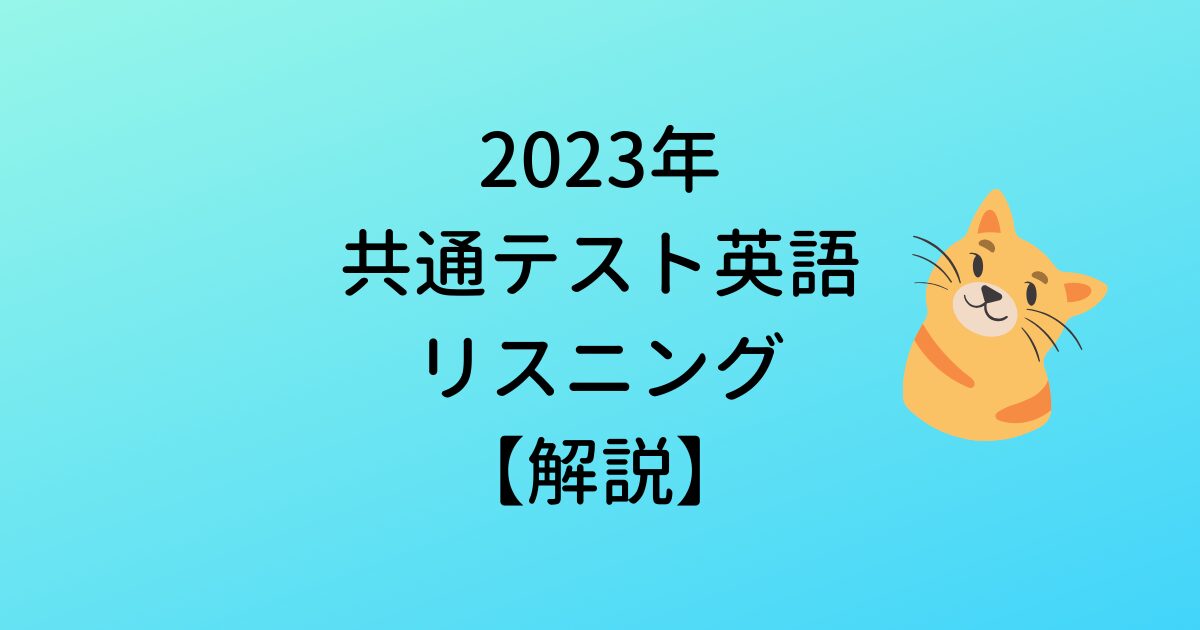問題
第3問は7:56から
第3問は問12から問17までの6問です。それぞれの問いについて、対話の場面が日本語で書かれています。対話を聞き、問いの答えとして最も適切なものを、四つの選択肢のうちから一つずつ選びなさい。
問12 地下鉄の駅で、男性が目的地への行き方を質問しています。
Which subway line will the man use first?
- The Blue Line
- The Green Line
- The Red Line
- The Yellow Line
問13 夫婦が、夕食について話し合っています。
What will they do?
- Choose a cheaper restaurant
- Eat together at a restaurant
- Have Indian food delivered.
- Prepare Indian food at home.
問14 高校生同士が、授業後に話をしています。
What did the boy do?
- He checked his dictionary in class.
- He left his backpack at his home.
- He took his backpack to the office.
- He used his dictionary on the bus.
問15 寮のパーティーで、先輩と新入生が話をしています。
What is true about the new student?
- He grew up in England.
- He is just visiting London.
- He is studying in Germany.
- He was born in the UK.
問16 同僚同士が話をしています。
What will the man do?
- Buy some medicine at the drugstore
- Drop by the clinic on his way home
- Keep working and take some medicine
- Take the allergy pills he already has
問17 友人同士が、ペットについて話しています。
What is the man going to do?
- Adopt a cat
- Adopt a dog
- Buy a cat
- Buy a dog
解説 問12
地下鉄の駅で、男性が目的地への行き方を質問しています。

Excuse me. I’d like to go to Central Station. What’s the best way to get there?
すみません。中央駅に行きたいのですが、一番良い行き方は何ですか?

After you take the Green Line, just transfer to the Blue Line or the Yellow Line at Riverside Station.
グリーンラインに乗った後、リバーサイド駅でブルーラインかイエローラインに乗り換えてください。

Can I also take the Red Line first?
レッドラインに最初に乗ってもいいですか?

Usually that’s faster, but it’s closed for maintenance.
通常はその方が早いのですが、メンテナンスのため運休しています。
Which subway line will the man use first?
男性はどの地下鉄路線を最初に利用しますか?
選択肢を確認しましょう。
1. The Blue Line
2. The Green Line
3. The Red Line
4. The Yellow Line
女性の説明にこうあります。
After you take the Green Line, just transfer to the Blue Line or the Yellow Line at Riverside Station.
グリーンラインに乗った後、リバーサイド駅でブルーラインかイエローラインに乗り換えてください。
最初に「グリーンライン」に乗ります。ということで、正解は「2」です。

女性の説明で出てきたのは「Green Line」→「Blue Line」→「Yellow Line」の順ですので、最初に乗るのは「Green Line」とは想像がつきそうです。「Red Line」については、そのあとで「maintenance / メンテナンス」という話がありますので、違うとわかりますね。
解説 問13
夫婦が、夕食について話し合っています。

Would you like to go out for dinner?
夕食に出かけたいですか?

Well, I’m not sure.
うーん、よくわかりません。

What about an Indian restaurant?
インド料理のレストランはどうですか?

You know, I like Indian food, but we shouldn’t spend too much money this week.
インド料理は好きだけれど、今週はあまりお金を使わないほうがいいわ。

Then, why don’t we just cook it ourselves, instead?
じゃあ、代わりに自分たちで料理するのはどう?

That’s a better idea!
そのほうがいいアイデアだね!
What will they do?
彼らは何をするつもりですか
選択肢を確認しましょう。
1. Choose a cheaper restaurant
もっと安いレストランを選ぶ
2. Eat together at a restaurant
レストランで一緒に食べる
3. Have Indian food delivered.
インド料理をデリバリーしてもらう
4. Prepare Indian food at home.
インド料理を家で作る
男性が「Then, why don’t we just cook it ourselves, instead? / じゃあ、代わりに自分たちで料理するのはどう」と提案し、女性が「That’s a better idea! / そのほうがいいアイデアだね!」と賛同しています。
ということで、正解は「4」です。

男性がインド料理レストランを提案したとき、女性が「I like Indian food, but ~」と言っています。「but」があるので、その提案は却下されたことがわかります。またその後の「shouldn’t spend too much money / あまりお金を使わないほうがいい」からも、選択肢は絞ることができますね。
解説 問14
高校生同士が、授業後に話をしています。

I can’t find my dictionary!
辞書が見つかりません!

When did you use it last? In class?
最後に使ったのはいつですか。授業中ですか。

No, but I took it out of my backpack this morning in the bus to check my homework.
いいえ、でも今朝バスの中で宿題をチェックするために、リュックサックから取り出しました。

You must have left it there. The driver will take it to the office.
そこに置き忘れたに違いありません。運転手がオフィスまでそれを持って行きますよ。

Oh, I’ll call the office, then.
ああ、それならオフィスに電話してみます。
What did the boy do?
その少年は何をしましたか
選択肢を確認しましょう。
1. He checked his dictionary in class.
授業中に辞書を調べた。
2. He left his backpack at his home.
リュックサックを家に置いてきた。
3. He took his backpack to the office.
リュックサックをオフィスに持って行った。
4. He used his dictionary on the bus.
バスの中で辞書を使った。
少年はこのように言っています。
No, but I took it out of my backpack this morning in the bus to check my homework.
いいえ、でも今朝バスの中で宿題をチェックするために、リュックサックから取り出しました。
バスの中で辞書を使っています。ということで、正解は「4」です。

女性の「In class?」に対して「No」ですから、「1」はすぐ消せそうです。あとは辞書がないと騒いでいるのに、リュックサック自体を忘れているという「2」もさすがに違いますね。あとは「check my homework」や「driver」辺りからも正解を絞れそうです。
解説 問15
寮のパーティーで、先輩と新入生が話をしています。

How was your first week of classes?
最初の週の授業ははどうでしたか?

Good! I’m enjoying university here.
良かったです! 僕はここの大学生活を楽しんでいます。

So, are you originally from here? I mean, London?
ところで、あなたはもともとここの出身ですか。つまり、ロンドン出身ですか

Yes, but my family moved to Germany after I was born.
はい、でも私の家族は私が生まれた後に、ドイツに引っ越しました。

Then, you must be fluent in German.
それなら、あなたはドイツ語が堪能に違いないわね。

Yes. That’s right.
はい、その通りです。
What is true about the new student?
新入生について、本当なのはどれですか
選択肢を確認しましょう。
1. He grew up in England.
彼はイギリスで育ちました。
2. He is just visiting London.
彼はロンドンを訪れているだけです。
3. He is studying in Germany.
彼はドイツで勉強しています。
4. He was born in the UK.
彼はイギリスで生まれました。
「ロンドン出身ですか」と聞かれて、新入生はこう答えました。
Yes, but my family moved to Germany after I was born.
はい、でも私の家族は私が生まれた後に、ドイツに引っ越しました。
つまり生まれはロンドンですが、育ったのはドイツです。もちろんロンドンはイギリスの首都です。ということで、正解は「4」です。

女性の「I mean, London?」に対して「Yes, but ~」と返答していますので、単純なロンドン出身でないことがわかります。また出身地の話をしているのに「2」「3」の選択肢は、少々的外れです。ただ直接「UK」で生まれたとは言っていないので、少し難しかったかも。
解説 問16
同僚同士が話をしています。

How are you?
調子はどうですか

Well, I have a runny nose. I always suffer from allergies in the spring.
鼻水がでる。春になるといつもアレルギーに悩まされる。

Do you have some medicine?
薬は持っていますか

No, but I’ll drop by the drugstore on my way home to get my regular allergy pills.
持ってないけど、帰りにドラッグストアに寄って、いつもの抗アレルギー薬を買うよ。

You should leave the office early.
早く会社を出た方がいいですね

Yes, I think I’ll leave now.
はい、もう出ようと思います。
What will the man do?
男性は何をするつもりですか
選択肢を確認しましょう。
1. Buy some medicine at the drugstore
ドラッグストアで薬を買う
2. Drop by the clinic on his way home
帰りにクリニックに寄る
3. Keep working and take some medicine
仕事を続けながら薬を飲む
4. Take the allergy pills he already has
すでに持っている抗アレルギー薬を飲む
男性はこう言っています。
I’ll drop by the drugstore on my way home to get my regular allergy pills.
持ってないけど、帰りにドラッグストアに寄って、いつもの抗アレルギー薬を買うよ。
「ドラッグストアで薬を買う」と言っています。ということで、正解は「1」です。

女性の「Do you have some medicine? / 薬は持っていますか」に対して「No, but ~ / 持っていないけど…」と答えています。薬は持っていないけれど、この男性はどうするのでしょうか。気になりますね。するとその後の「drugstore」を聞き逃すことはないでしょう。基本的に「but」の後には注意を払うべきです。
解説 問17
友人同士が、ペットについて話しています。

What a cute dog!
なんてかわいい犬なんだ

Thanks. Do you have a pet?
ありがとう。あなたはペットを飼っていますか

I’m planning to get a cat.
猫を飼うつもりです。

Do you want to adopt or buy one?
あなたはそれを引き取りたいですか、それとも購入したいですか

What do you mean by ‘adopt’?
「引き取る」とはどういう意味ですか

Instead of buying one at a petshop, you could give a new home to a rescued pet.
ペットショップで購入する代わりに、保護されたペットに新しい家を与えることもできるのですが。

That’s a good idea. I’ll do that!
それはいい考えですね。そうします。
What is the man going to do?
男性は何をするつもりですか
選択肢を確認しましょう。
1. Adopt a cat / 猫を引き取る
2. Adopt a dog / 犬を引き取る
3. Buy a cat / 猫を購入する
4. Buy a dog / 犬を購入する
まず男性は「I’m planning to get a cat. / 猫を飼うつもりです」と言っています。この時点で「2」「4」を消すことができます。
また「adopt」の意味を女性にたずねて、その説明の後「That’s a good idea. I’ll do that! / それはいい考えですね。そうします」と答えています。つまり「buy」ではなく「adopt」を選んだとわかります。
ということで、正解は「1」です。

先に選択肢を確認しておきましょう。すると、「cat」か「dog」かの選択と、「adopt」と「buy」の選択しかないとわかります。それを意識しながら対話を聞くと、情報が取りやすくなりますね。



コメントをどうぞ